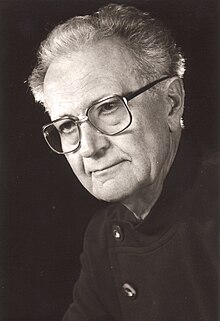Wolfgang Perschmann
Wolfgang Perschmann (born January 22, 1912 in Berlin ; † May 5, 2001 in Kluse-Steinbild ) was a German choir director, organist, conductor, author and lecturer at the Folkwang University of the Arts in Essen .
Childhood and youth
Perschmann grew up in a musical family. His mother was a pianist and piano teacher, his father played the violin. At the age of 15 he first visited the opera, the Städtische Oper Berlin . Richard Wagner's Rheingold decisively shaped his lifelong relationship with Wagner's musical dramas. At the age of 17, Perschmann gave a lecture on Wagner's Der Ring des Nibelungen and Parsifal as part of the activities of the Wagner Youth Association in Berlin. In 1930 he attended the Bayreuth Festival, where he met Arturo Toscanini in the festival hall. During his school days he took piano and organ lessons and then studied organ playing with figured bass and counterpoint with Arthur Egidi .
Further life
At the State Academy for Church and School Music he passed the state examination for organists and choir conductors as an external musician, he took conducting lessons in the senior orchestra master class with Bruno Kittel at the Stern Conservatory, and was also taught piano reduction and score playing. In 1937 he was engaged at the Landestheater Oldenburg , where he studied little-known works by Mozart, and a year later he was appointed conductor at the new Saarbrücker Theater .
In 1942 Perschmann was forcibly recruited to Norway, where he internally distanced himself strongly from the injustice system of National Socialism and where his first literary works were created. After the war he was choir director at the Landestheater Darmstadt for a short time ; during this time he completed the poem The Great Dialogue . Perschmann then worked for Walter Felsenstein at the Komische Oper Berlin for six years , followed by 14 years as a university lecturer at the Folkwang Academy of Music in Essen.
Perschmann wrote analytical works on Richard Wagner's music and organized well-attended lecture series on this topic in Bayreuth during the festival.
He was an honorary member of both the Austrian and the German Richard Wagner Society.
Fonts
- Timeless topicality - Bayreuth 1982
- World Breath of Love Tristan and Isolde - Graz 1989, ISBN 3-901149-01-5
- Richard Wagner, Parsifal. Swan shot, knowledge kiss, glowing liberation - Graz 1991, ISBN 3-901149-00-7
- Hugo von Hofmannsthal and Richard Strauss, The woman without a shadow - Graz 1992, ISBN 3-901149-06-6
- The Mastersingers of Nuremberg - art, madness, love - Graz 1996, ISBN 3-901149-08-2
- The ring of the Nibelung in a holistic representation - The optimistic tragedy - Graz 1986, ISBN 3-901149-02-3
- From the grace of the will to know . Answers in Wagner's Ring and Parsifal - Bedburg / Erft 1997.
Web links
| personal data | |
|---|---|
| SURNAME | Perschmann, Wolfgang |
| BRIEF DESCRIPTION | German choir director, organist, conductor, author and lecturer |
| DATE OF BIRTH | January 22, 1912 |
| PLACE OF BIRTH | Berlin |
| DATE OF DEATH | May 5, 2001 |
| Place of death | Kluse stone image |
